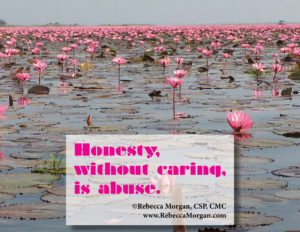
Nearly everyone I’ve known has said they want honest feedback on areas they can improve.
Hearing this, some perceive it as an invitation to be mean. Sometimes really mean. Insulting. Demeaning. Humiliating.
Abusive.
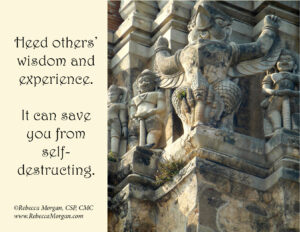
A pal has been a supervisor at our local hardware store for eight years. He recently shared a story about Eric, the new general manager — someone who’d never worked in a hardware store and was hired about 6 months ago.
Eric is a nice guy, but he doesn’t see how he’s causing himself to fail. It appears that Eric has a lot of confidence since he never asks anyone else for input. The result is a messy store, frustrated staff and irritated customers. The store sales numbers are suffering as a result.
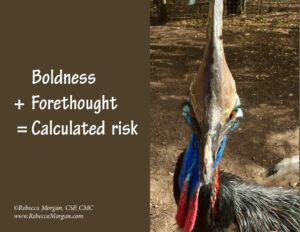
“Take calculated risks. That is quite different from being rash.” —George S. Patton from a letter to Cadet George S. Patton IV, June 6, 1944
Taking calculated risks means boldness with forethought. It means weighing the outcome and avoiding unwise action. A calculated risk might be giving a presentation to your boss’ peers, telling someone they have a habit that annoys you, volunteering for a project you’ve never done before, or trying a new sport.
We can learn to take calculated risks, and they get easier with repeated attempts. Eventually you learn that you can pick yourself up and continue even if your boldness causes you to fall flat.
Morgan W. McCall Jr., coauthor of What It Takes: Decision Makers at Work, conducted a study comparing 20 successful Fortune 500 executives with 20 whose careers hadn’t been successful. One difference he found was that the achievers were secure enough to admit their fallibility, and they handled their mistakes with poise and grace. They analyzed their mistakes and learned from them, but they didn’t become obsessed. “Executive achievers don’t dwell on their mistakes and aren’t afraid to take risks for fear of failing again,” says McCall.
Many times it has been difficult for me to overcome my initial paralysis when faced with a risky challenge. Years ago when I entered the pension business, my boss assigned me to call on one tax attorney per day. Attorneys intimidated me. I almost had a heart attack.
My comfort zone was narrow. I felt comfortable calling on other insurance agents to ask them to recommend our services, but that was not where the real business was. The business came from tax attorneys and accountants.
After a few months of stressful and anxiety-ridden calls, my comfort zone expanded, and I was comfortable calling attorneys. But it wasn’t easy to overcome my self-doubts and intimidation. I learned from reading, workshops, and experienced friends that all growth occurs outside the comfort zone.
Now as I enter new areas requiring a stretch of my comfort zone, I’ve learned to ask myself these questions. Use them to help you act outside your comfort zone. When deciding to take a risk, write your responses to these six questions.
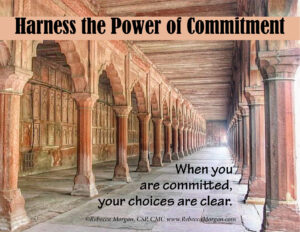
“Do or die!”
“Don’t give up the ship!”
“Damn the torpedoes and full speed ahead!”
Military expressions are valuable during war when the price of failure is death. But they lose impact in our business or private life: failure is not quite as final. However, these sayings are based on a principle that applies to all aspects of our lives: commitment.
This commitment to one’s goals is, for me, the most important rule for success. Without it, we fall prey to procrastination, bad habits, laziness, rationalization and a host of goal-defeating problems.
Commitment is a strong word — much stronger than “agreement.” If I agree to meet you for a movie, I have three options — keeping my agreement, cancelling, or changing it. If I commit to meeting you, I will meet you no matter what.
This is a brief clip on Google’s Project Aristotle. This information is also included in my book, Leadership Lessons from Silicon Valley: How to Survive and Thrive in Disruptive Times, which can be ordered here.
In leadership training, participants are typically told how important listening is. Yet few heed the advice.
I can understand why. Often, it’s because we already think we are good listeners. But how a leader listens is more crucial than one’s listening style as a peer.
Leaders’ everyday behaviors have gravitas and impact. Subtleties and nuances can be misinterpreted and blown out of proportion. The simple act of pushing back on an idea can send a leader’s direct report into a tizzy. Leaders have to be much more mindful of how they respond to ideas offered by their direct reports.
I call this “leaderful listening.” I learned how to listen better as a leader from doing it wrong.
When I was in my first year on the board of my national professional association, I thought I was a good leader. But I had a lot to learn.
Tom, a long-time member approached me to suggest that our national convention should always be in his home city, San Francisco. I proceeded to tell him it was too expensive, our members liked to go to different cities each year, and there weren’t a lot of hotels that could accommodate the quantity of meeting rooms we need. Case closed.
I was essentially saying it was a stupid idea.
Is that how a good leader would listen. No!

Some people are drawn to forceful leaders. Others appreciate leaders who have a gentler approach.
I — and many others — find the combination of vulnerability plus strength is compelling. Many people feel connected to others who are willing to show humility, admit when they are wrong, demonstrate heartfelt emotions, and express sincere caring for others.
What a delight to receive a special gift a week after I spoke at the San Diego Professional Coaches Alliance. It wasn’t a plaque, mug, or letter opener (although they did give me a great water bottle at the event). It was this wonderful recap article of my talk in their newsletter, with a link … Read more
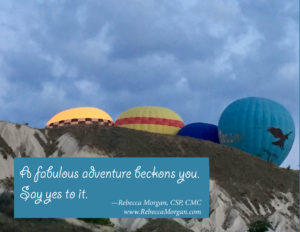
I’m afraid of heights. Just thinking about climbing a ladder makes my stomach queasy.
So imagine my reaction when I was in Istanbul and a friend suggested I go to Cappadocia in central Turkey for a hot air balloon ride, I was not immediately excited.
That is an understatement.
I’m grateful to work with the wonderful people at Leaderonomics in Malaysia and their wonderful clients. It’s great to be featured with such excellent speakers.